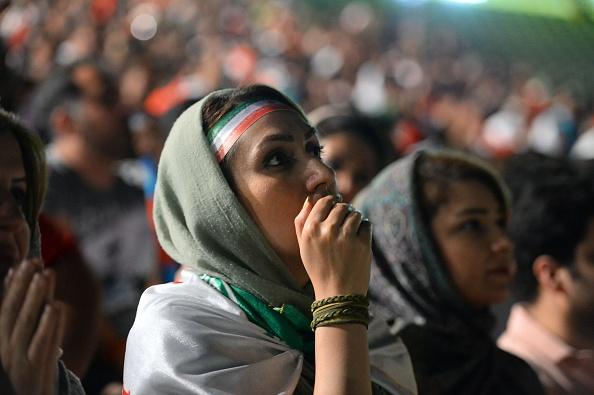Progress on Ban for Women at Stadiums

(Beirut) – Iranian authorities and the International Federation of Football Associations (FIFA) should ensure that women and girls can freely attend all future men’s sports matches in the country, Human Rights Watch said today. On June 20 and 25, 2018, the authorities opened Azadi stadium’s doors to women and men to watch a live screening of the last two games of Iran’s national football team at the 2018 World Cup.
On June 26, Masoumeh Ebtekar, the vice president for women and family affairs, tweeted a video of women attending the screening and said, “Thousands of Iranian families have watched live broadcasts of #WorldCup2018 games in Azadi Stadium in Tehran. Restrictions on women’s entrance have been lifted. This has led to a new era of hope & optimism.” On June 25, Iranian journalists posted a video on Twitter that shows women watching the Iran- Germany volleyball match, during the FIVB Volleyball Nations League 2018, in Azadi stadium. Since June 2017, Iranian authorities had allowed a limited number of pre-vetted women to attend the volleyball matches.
“Iranian authorities have finally taken a long-awaited step of de facto overturning the ban on women attending stadiums in the past two games,” said Sarah Leah Whitson, Middle East director at Human Rights Watch. “This experience shows how shallow the many justifications for keeping women out of the stadiums were, and Iran should ensure that women can freely attend all sporting events across the country from now on.”
Iran’s discriminatory ban on women attending men’s football matches dates to 1981. In 2012, authorities extended the ban to volleyball matches. In response, Iranian women have campaigned and lobbied parliament to reverse the ban. They have even disguised themselves as men to avoid these discriminatory restrictions. Over the past few years, Iranian womenand rights organizations have also tried to reverse the policy through direct appeals to FIFA and the international volleyball federation (FIVB).
In March, police arrested about 35 women who gathered in front of Azadi Stadium seeking admission to watch a game between two popular Tehran men’s football teams, Esteqlal and Persepolis, and detained them for several hours. The FIFA president, Gianni Infantino, was inside the stadium while the police arrested the women outside.
Following criticism from rights activists and the Iranian womencampaigning to remove the ban, the FIFA chief announced that President Hassan Rouhani had told him that there are plans to allow women to attend football matches in the country “soon.”
Over the past few years, several acclaimed athletes, including the captain of Iran’s national football team, Masoud Shojaei, parliament members, and Rouhani have spoken about the need to allow women back into stadiums.
Before Iran’s World Cup games were screened at the stadium, several members of parliament pushed authorities to ensure that women could attend. On June 25, Tayebeh Siavoshi, a member of parliament who attended the Iran-Spain match screening, tweeted that “during the game, several men were coming to us and thanking us for making it possible that they could finally watch the game with their families. Their gratitude was so honest and genuine that I was thinking why we have taken away such simple pleasure from our families.”
Since 2014, Human Rights Watch has repeatedly communicated its concerns to both sports federations in writing and in person at meetings in Lausanne, where the FIVB has its headquarters. In 2015, Human Rights Watch opened the #Watch4Women campaign, to support Iranian women fighting this form of discrimination.
Article 3 of FIFA’s statute states that “discrimination of any kind… is strictly prohibited and punishable by suspension or expulsion.”
“International Federations should do their part and use their significant leverage to ensure that Iranian women are never discriminated against at sports matches,” Whitson added